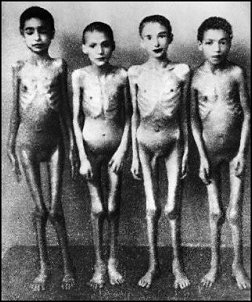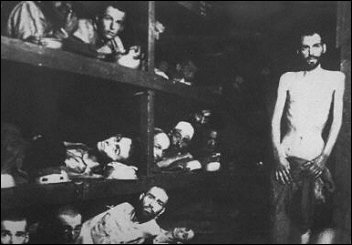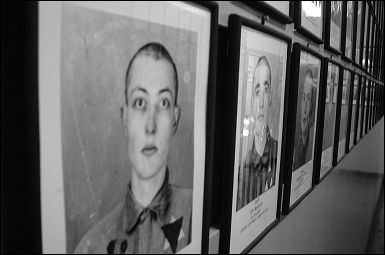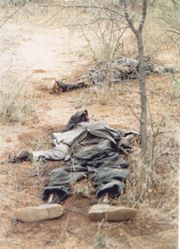‘Granice mojego jezyka sa granicami...
Komentarze: 2

Wittgenstein

Derek Jarman 'Wittgenstein'
Antropologowie Sapir I Whorf uwazaja, ze jestesmy tylko tyle w stanie zobaczyc I poczuc ile oferuje nam nasz jezyk. Moze sprostowalabym to droche I dodala, ze tyle mozemy WYRAZIC na ile pozwala nam jezyk. No to uczmy sie wyrazac, kopac w umyslach I nie bac sie mowienia. Bo to jest chyba to co laczy nas ze swiatem I pozwala wiecej z niego czerpac.
To taka tam drobna refleksja jaka za mna caly czas chodzi (Polecam wszystkim strone www.jezyk-gietki.pl, przydatna I mozna cos z niej wyciagnac)
A dzisiaj rocznica wyzwolenia Auschwitz, trabia o tym na BBC I nie chce nawet myslec co dzieje sie w Polsce. Ale nie podoba mi sie takie przesadne czasem rozdmuchiwanie tamtego okresu. Bylo, minelo, wyciagnielismy wnioski no I teraz pracujmy na tym any sie nie powtorzylo. A tutaj w Polnocnej Korei obozy pracy, w Ameryce Latynowskiej miliony cywilow mordowanych przez armie, tysiace umierajacych z glodu w Afryce, a my tutaj caly czas siegamy do historii I wyciagamy stamtad najtragiczniejsze momenty podczas gdy tak duzo dzieje sie teraz.
Czytalam jakis artykol, chyba w The Economist, o pomocy dla ofiar tsunami – gdzie te pieniadze ida I tak dalej. Bylo tam kilka przykladow jak malo sie robi aby ZAPOBIEC katasrofom naturalnym. To chyba w Bangladeszu (A moze w Mozambiku, nie pamietam) przed ogromnym trzesieniem ziemi jakies 2-3 lata temu apelowano o fundusze, ktore pomoglyby zapobiec katastrofie. Ci ktorzy prosily, otrzymali moze z cwierc tego, co bylo potrzebne. Po katastofie, kiedy tysiace ludzi zginelo, ze swiata naplynelo kilkadziesiat razy wiecej pieniedzy jak te ktore byly potrzebne do zabezpieczenia ludzi, a ktore nigdy nie dotarly.
No dobra, mamrocze dzis cos ponuro, ale czasem warto jest sie zastanowic nad takimi rzeczami.



Sofia Strzalkowska
Zdjecia tych, ktorzy nie doczekali wyzwolenia obozu.
Pictures of those who died before the liberation.

Afryka/ Africa 2003

Poludniowa Afryka, cywile mordowani przez armie rzadowa.
South Africa, civilians murdered by government army.
(‘The borders of my language are the borders of my world’ WITTGENSTEIN)
Anthropologists Sapir and Whorf think that we can only see and feel as much as our language allows us for. And I would change it a bit and say that as much we can EXPRESS as our language allows us to. So let’s learn to express, dig in minds and don’t be afraid to talk, because words seem to connects us with the world and enable to take the most of it.
It's just a reflection that is a lot with me lately.
Today is the anniversary of liberation of Auschwitz. They made a report on BBC and I can only imagine what is happening in Polish media. But I don’t like this pulling out of events from the past and focusing on them, sometimes to the excess. It happened, passed; we took a lesson from that time and now let’s try not to let it happen again.
In North Korea work camps, in Latin America thousands of civilians murdered by an army, in Africa people dying of famine, and so let's don't just look into the past, there is a lot happening now.
I’ve read an article, as far as I can remember in The Economist, about aid for tsunami’s victims. There were few examples on how little is being done to PREVENT natural disasters. I think it was in Bangladesh (or maybe in Mozambique) where before an enormous earthquake around 2-3 years ago, it had been said that a certain sum of money would be needed to secure people. Those who asked received maybe a quarter of the funds needed. After the disaster, when thousands of people died, the country received an aid of few times more money than was originally needed to prevent the damage.
All right, I’m mumbling something gloomily, but sometimes it’s worth thinking about things like that.